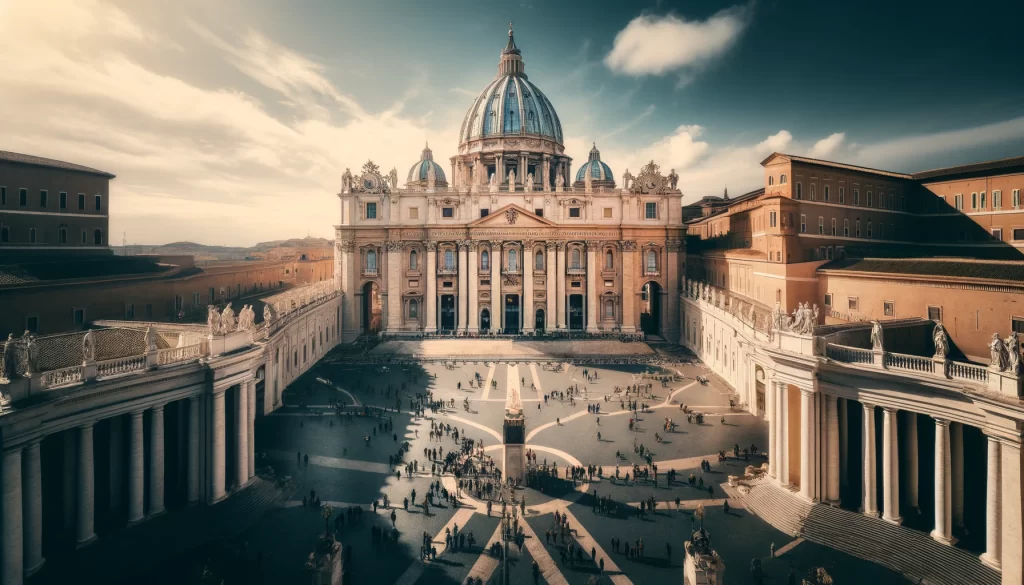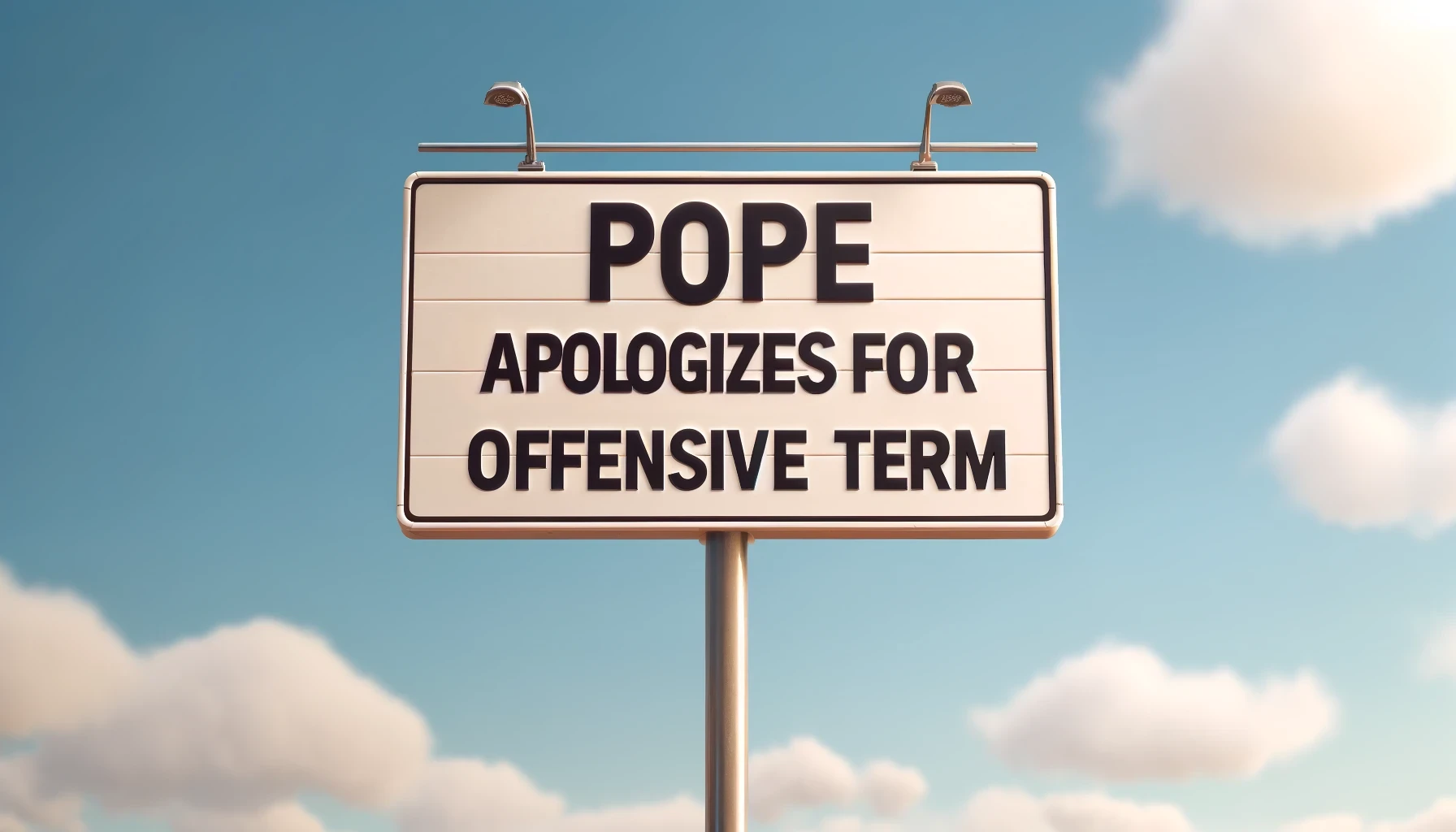Pope Francis apologized on Tuesday after reports surfaced that he used an offensive term referring to gay men during a private meeting with Italian bishops. The incident occurred during a discussion about whether openly gay men should be admitted to seminaries, institutions where priests are trained.
During the meeting, which took place last week, the Pope reportedly said that there was already too much “frociaggine” in some seminaries. This Italian word translates roughly to “faggotness.” This remark led to a media storm, prompting the Vatican to issue an apology.
Matteo Bruni, the director of the Vatican’s press office, stated, “The pope never intended to offend or express himself in homophobic terms, and he extends his apologies to those who were offended by the use of a term, reported by others.” Bruni emphasized that the Pope’s comment was not meant to be offensive and was taken out of context.
The meeting was part of an annual assembly of the Italian bishops’ conference. The bishops were discussing various issues, including the admission of gay men to the priesthood. Pope Francis reiterated his stance that gay men should not be allowed into seminaries, citing concerns about leading a double life.
This is not the first time Pope Francis has faced criticism over his remarks about the LGBTQ+ community. In a 2018 interview, he expressed concerns about homosexuality in the priesthood, calling it a “serious issue.” He has, however, made efforts to be more inclusive, famously stating, “Who am I to judge?” in response to a question about gay priests early in his papacy.
Despite these efforts, the Pope’s recent comment has sparked backlash, highlighting the ongoing tension within the Catholic Church regarding its stance on LGBTQ+ issues. Some bishops and conservative members of the Church have criticized the Pope’s inclusive approach, arguing that it contradicts traditional Church teachings.

Papal apologies are rare and usually address historical wrongs rather than immediate incidents. This quick apology reflects the influence of the internet and the Pope’s awareness of the impact of his words on the LGBTQ+ community and the wider public.
The Pope’s remarks were first reported by Italian media outlets, which quoted unnamed bishops who were present at the meeting. These reports led to widespread coverage and criticism from various groups and individuals advocating for LGBTQ+ rights within the Church.
In response to the apology, some LGBTQ+ advocacy groups have called for clearer statements from the Pope regarding his views on gay priests. They argue that without clarification, the Pope’s words could be interpreted as a blanket ban on gay men entering the priesthood, which many believe is unjust given the number of gay men who faithfully serve the Church.
The Vatican’s official stance, as articulated in documents from 2005 and 2016, is that men with “deep-seated homosexual tendencies” should not be admitted to seminaries. This position has been criticized as hypocritical and homophobic, especially given the presence of gay priests within the Church.
Pope Francis has been known for his outreach to the LGBTQ+ community, including allowing priests to bless same-sex couples and calling for an end to anti-gay legislation. However, his occasional controversial remarks and the Church’s official policies continue to create a complex and often contentious relationship with LGBTQ+ individuals.
This article is based on the following articles:
https://apnews.com/article/pope-gay-priests-francis-vatican-92ee291bbeef00a898a10a8a45afd32c

Background Information
The Role and Influence of the Pope
The Pope, also known as the Bishop of Rome, is the leader of the worldwide Catholic Church and the Vatican City State. The current Pope, Francis, was elected in 2013 and is known for his more progressive views compared to his predecessors. The Pope’s statements and actions have significant influence on the beliefs and practices of millions of Catholics around the world.
The Catholic Church and LGBTQ+ Issues
The Catholic Church has a long history of conservative views on issues related to sexuality and gender. The official teaching of the Church considers homosexual acts to be sinful, although having homosexual tendencies is not considered a sin. The Church promotes celibacy for all its clergy and expects them to abstain from any sexual activity.
Seminaries and Priesthood
Seminaries are educational institutions where individuals train to become priests. The training includes theological education, spiritual formation, and pastoral practice. The Catholic Church has strict guidelines about who can be admitted to seminaries and ordained as priests, including prohibitions against admitting openly gay men.
Vatican’s Stance on Gay Priests
The Vatican has issued several documents outlining its stance on the ordination of gay men. A key document from 2005, issued under Pope Benedict XVI, states that men who practice homosexuality, have deep-seated homosexual tendencies, or support the so-called “gay culture” should not be admitted to seminaries or ordained as priests. This stance was reaffirmed in 2016.
Pope Francis’ Approach to LGBTQ+ Community
Pope Francis has taken a somewhat more inclusive approach towards LGBTQ+ individuals compared to previous Popes. Early in his papacy, he made headlines with his statement, “Who am I to judge?” in response to a question about gay priests. He has also supported civil unions for same-sex couples and allowed priests to bless same-sex couples, emphasizing the importance of pastoral care and inclusion.
Controversies and Criticisms
Despite his more inclusive statements, Pope Francis has also made remarks that have been criticized as offensive or insensitive towards the LGBTQ+ community. His recent use of an offensive term in a private meeting with bishops is an example of such controversies. These incidents highlight the tension within the Church between traditional teachings and more progressive attitudes towards LGBTQ+ individuals.
Papal Apologies
Apologies from the Pope are significant events. Historically, Popes have issued apologies for past wrongs committed by the Church, such as its treatment of women, Jews, and indigenous peoples. These apologies are seen as efforts to reconcile with those who have been wronged and to demonstrate the Church’s willingness to acknowledge and address its past mistakes.
The Importance of Media in Vatican Communications
The role of media is crucial in how the actions and words of the Pope are perceived globally. Reports from journalists and statements from the Vatican’s press office play a significant role in shaping public opinion and understanding of the Pope’s statements and actions. The rapid spread of information through the internet and social media means that the Pope’s words are scrutinized and reacted to quickly, which can lead to immediate responses from the Vatican, as seen in the recent apology.
Understanding the Term “Frociaggine”
The term “frociaggine” is an Italian slang word that is derogatory and offensive when referring to gay men. Understanding this term is important to grasp why Pope Francis’ use of it caused such a strong reaction and necessitated an apology. Language nuances and cultural contexts can significantly impact how statements are perceived and the level of offense they might cause.
The Italian Bishops’ Conference
The Italian Bishops’ Conference (Conferenza Episcopale Italiana, CEI) is an assembly of Catholic bishops in Italy. They meet regularly to discuss issues affecting the Church in Italy. The recent meeting where Pope Francis made his controversial remarks was one such gathering, focused on various church matters including the admission of gay men to seminaries.

Debate/Essay Questions
- Should the Catholic Church allow openly gay men to become priests?
- Can the Catholic Church maintain its traditional teachings while being inclusive of the LGBTQ+ community?
- How does the Catholic Church’s stance on homosexuality compare with other major religions?
Please subscribe to Insight Fortnight, our biweekly newsletter!
